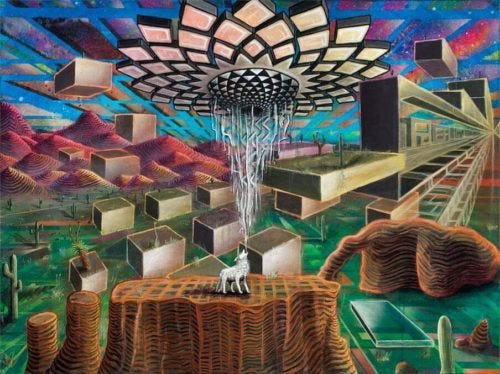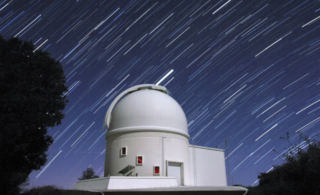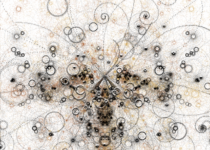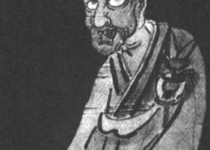Future objects of veneration
The reorganisation of humanity as imagined in my post on world government requires an adjustment which might need to be revolutionary. If during the transition, the world descends into chaos, it will be important to have some touchstones, some values that can guide us and keep us on track.
For many people, this comes in the form of religion. But are the ancient religions able to speak in the language of the future?
I feel that if we are to venerate something in the future, it must be something universal, that transcends any particular time or place. Some pantheon of divinity so universal that if we were to discover alien civilisations, we would discover temples to the very same things.

What gods are so universal that they arise naturally as an object of veneration?
The Absolute Gods.
For any ideal or quality that is worth something to us as a society, there is an absolute form which can be aspired towards, but never attained. It can guide us and shape us, and in its value to us, it is in a sense already holy.
One example of such an ideal is Truth. It’s a value that we hold each other to, and it has a very high place in our society, in law, in science. We put our hands on a Bible in western nations and swear to it already.
There is no question as to whether these absolutes exist like material objects exist, yet they assert themselves onto human existence unbidden, and have a sort of divine quality. Some may have been manifested as deities in pantheons before, but they don’t need to be given the status of Gods. They are real enough in the sense that we all know and recognise them for what we are when we experience them (there is plenty of room for philosophical debate here, but I don’t see that as ever going away).
Society already has a pantheon of absolutes – as well as Truth there is Love, Beauty, Compassion, Honour, Service, Humility, the list is actually endless but becomes more and more particular, less absolute, so a society would select a smaller, core set. Most societies place a high value on a number of them already, but they are not well codified into how things are run. In part, we rely on their incorporation into old religions – thus we have ‘christian values’ when we really want to talk about compassion or humility (unhelpfully, it is not often specified).
In the future, society would benefit from being more explicit about what the absolute values are, and we could treat them like we treat divinities – it would not hurt to have public buildings dedicated to such things, and lifetime pursuits spent in trying to realise them completely. If there was a priesthood of Truth, I think that would be a useful voice in our society – one that was not grounded in any earthly concern, but had a higher calling.
I note that an all-powerful One God arises logically from any contemplation on the absolute of absolutes. The god of monotheism is a kind of mathematical necessity. And it is also natural to want to worship the ‘most powerful’ of the deities. Such a God will always stand at the top of a list of objects of veneration. But because the One God contains all qualities, it is problematic as an object of worship, for where does one direct the worship? We might kid ourselves, but the fact is that monotheisms all end up reflecting the nature of the society in which they emerge. I do not deny that One God exists, but that One remains above, ineffible, intangible and uninterested. For this reason, despite its popularity in some regions of the world over the last two thousand years, I don’t think the conception of a One God has anything of use to those who need to conceptualise divinity.
On the other hand, an attempt to find fragments of the One God is possible on Earth, through our realisation that absolutes like Truth, Beauty and Love are the manifestations of the ultimate. Conveniently, many of the temples are already built to these gods in our houses of law, and our art galleries, and our churches (which represent their district’s distintive cultural manifestation of the absolute).
The Universe and Gaia
The total of all that IS, materially, is a more tangible object of worship than one God, and clearly deserves a place in the pantheon. The Greeks envisaged it as Ouranos (‘Uranus’-the planet was discovered and named much later) as a father, and it is a natural object of veneration and contemplation. However a more immediate object of affection and veneration for a species is its home planet, and ours is Earth. She has also been worshiped through time and has been called Gaia.
Gaia according to Hesiod’s Theogony was one of the first four gods to emerge from Chaos. But I am adopting the name and applying it to the wider mother earth god which appeared in religions around the world. Shakti would perhaps do as well. There are many other names.
Green movements, those seeking to preserve the world’s ecosystems, and protect her from exploitation already incorporate a concept of Gaia into their values. There is no big shift then, to re-deify Gaia, but I think it is useful to crystallize the object of this work and passion.

Gaia deserves our veneration, for her beauty and power, and as the immediate creator and sustainer of our own wellbeing as a species. There should be temples to Gaia everywhere to remind us of our duty to protect our planet.
The Unknown
“A moment of doubt in the mind is a devil” echoes a belief held by many religions (I quote from Lin-Chi) that doubt, as opposed to faith, is a bad thing. Yet interestingly, science is built on a foundation of this healthy, doubting skepticism. Doubt is the attitude that naturally arises when we realise that we don’t and can’t know everything, and that what we think we know might turn out to be wrong after further inquiry.
The unknown doubtlessly exists, yet by definition, we can know nothing about it. All we can do is chip away at the edges, and in creating the desire in us to do this, it exerts a sort of negative force on human activity. The unknown is not lessened by our knowing, it just retreats further into the cracks, where it awaits to destabilize our vain constructions. Washing through all life, it is the forgetting of sleep, it is the blank curtain of death, the unwinnable secret. It is powerful and essential, and by firing our doubt it breaks our delusions and brings us closer to reality.
Self-doubt can be debilitating, yet it is also the foil of blind faith, and self-infatuated egoism. Used like a surgeons knife, doubt is a tool, and a fundamental value that underpins modern evidence-based decision making. The great unknown that is the source of doubt should be venerated for its acid-bath potency and its wisdom. Its temples already exist as our observatories, and our places of learning.
The Triptych
These three aspects of divinity make a triptych. I think there is a natural sense in this, and that this is a reflection on the way things really are. The test is whether the idea arises naturally to others, as anything that only occurs to me is useless, although we are all intimately connected to the ultimate, just as we are all connected to each other and to the big bang. The One God and the Unknown have merged to form the Universe, and just as Gaia is the child of the Universe, the child of Gaia, is life on Earth. That is how I see it.




One Comment